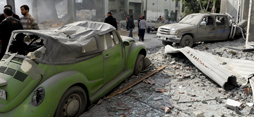

Preventing and Countering Violent Extremism
Promoting Juvenile Justice Standards to prevent the recruitment by violent extremist organizations
Overview
Children are increasingly affected by terrorism, but at the same time, increasingly engaged in terrorist related activity. International policy and law-making has struggled to keep up with the rapid changes in the field of preventing and countering violent extremism. Juveniles are recognized as a particularly unique group when thinking about crime. Their lack of full development and minimal life experiences may result in an inability to process information, while their decision-making skills may be less developed and are more impulsive. Therefore, juveniles are more easily manipulated, victimised and recruited by terrorist organization.
UNICRI firmly believes that effective counter terrorism policies for juveniles can only be developed by ensuring the full protection of children’s rights. The Convention of the Rights of the Child and the other international relevant standards cannot be disregarded while fighting violent extremism. Conversely, they set up very important principles that can significantly contribute to prevent the recruitment of at risk-juveniles and disengage those involved in terrorist activities. 2.
Key aspects and recommendations
Based on the research conducted and the implementation of projects, UNICRI has developed some guidelines to support the Member States in dealing with juveniles allegedly involved in terrorism activities and other serious crime:
• Focus on establishing and maintaining a holistic approach to the rule of law and justice when dealing with juvenile offenders, including those committing serious crimes.
• Incorporate international juvenile justice and child protection standards into national legislation and strengthening their implementation.
• Acknowledge the importance of establishing and facilitating separate juvenile justice system in order to protect juvenile offenders and offer them alternative treatments to adults.
• Affirm that all juvenile offenders are to be processed through the juvenile justice system and avoid to charge juveniles under adult criminal law.
• Consider children committing crimes first and foremost as victims.
• Ensure appropriate scope of discretion for relevant authorities allowing the provision of increased opportunities for dismissal of criminal proceedings or diversion.
• Ensure that the rights of the child, development of the child and reintegration into society remain as the guiding principles of alternative and diversion measures in all cases.
• Support further capacity building and implementation of guidelines on treatment of children to all the professionals dealing with juvenile justice cases.
• Establish judicial standards and provide adequate training for judges and courts.
• Ensure that national legislation is effectively implemented and enforced, and accurately reflected in current proceedings.
• Establish the deprivation of liberty for juveniles as a measure of last resort for all type of crimes.
• Provide for a gender specific approach and protection of vulnerable groups within the juvenile justice system taking into account specific and systemic challenges.
• Ensure that juvenile criminal records are inaccessible to the public and erased after a certain period of time.
Priority actions
Based on the key aspects and recommendations identified, UNICRI has developed a set of priority actions to assist the Member States in strengthening juvenile justice standards and promote diversion and alternative measures as effective means to promote disengagement and prevent the recruitment of juveniles by violent extremist and criminal organizations.
• Action I: Assess national juvenile justice framework and its consistency with international standards.
• Action II: Assess alternative and diversion measures adopted at the national level and evaluate their successful implementation and their impact in reducing recidivism.
• Action III: Developing national action plans to strengthen juvenile justice systems through legislative reforms and the design of effective diversion and alternative measures.
• Action IV: Design capacity building programmes for prosecutor, judges and lawyers, specifically focused on juvenile justice and serious crime.
• Action V: Improve the capacity of all the actors involved in the monitoring and supervision of alternative and diversion measures (probation officers, social services, teachers, etc.) in dealing with juveniles involved in violent extremism and other serious crime.
• Action VI: Develop regional mechanism to exchange good practices and expertise to deal with juvenile cases, especially those of juveniles allegedly involved in transnational crimes.
• Action VII: Raise awareness on children rights.
Outcome
UNICRI produced a “Report on Children and Counter-Terrorism” whose objective is to shed light on the vulnerability of children and juveniles in the context of counter-terrorism. The report examines the position of children in international law as perpetrators and victims of terrorism, providing a number of recommendations to increase the capacity of governments to integrate international juvenile justice and child protection standards into their national counter-terrorism frameworks.
UNICRI is also implementing the project “Assessing the pre-conditions for developing a juvenile diversion pilot program”, addressing the issue of vulnerable groups at risk of being involved in terrorism activities. Main aim of the project is to promote a wider use of diversion, probation and other alternative measures as effective tools to prevent radicalization and support disengagement. After conducting a preliminary analysis of the juvenile justice systems and alternative measures/diversion programmes in five selected Member States, UNICRI organized a series of workshops with national stakeholders to design effective national programmes and international guidelines to improve probation mechanisms, diversion and alternative measures for the protection of vulnerable groups allegedly involved in terrorism activities.




